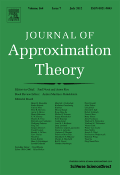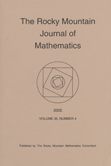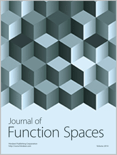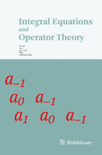
JOURNAL OF APPROXIMATION THEORY
Scope & Guideline
Unveiling New Horizons in Mathematical Sciences
Introduction
Aims and Scopes
- Polynomial Approximation:
This area investigates the properties and applications of polynomial approximations, including Bernstein-type inequalities, Markov inequalities, and convergence properties in different spaces. - Functional Analysis and Spaces:
The journal explores approximation in various functional spaces, such as Sobolev spaces, Banach spaces, and Bergman spaces, emphasizing their geometric and analytical properties. - Numerical Methods and Algorithms:
Research in this scope focuses on the development and analysis of algorithms for approximation, including neural networks, cubature formulas, and approximation error bounds. - Orthogonal Polynomials:
This includes studies on the properties, applications, and asymptotic behaviors of orthogonal polynomials, with a focus on their role in approximation theory. - Scattered Data and Function Recovery:
The journal publishes works on methods for recovering functions from scattered data, including interpolation techniques and the analysis of convergence rates. - Randomized Approximations:
This area covers the use of probabilistic methods in approximation, including randomized algorithms and their efficiency in approximation tasks.
Trending and Emerging
- High-Dimensional Approximation Techniques:
Recent articles emphasize the challenges and methodologies for approximating functions in high-dimensional spaces, reflecting the growing importance of this area in applications such as machine learning and data science. - Neural Networks in Approximation:
There is an increasing trend towards exploring the use of neural networks for approximation tasks, including error analysis and convergence guarantees, indicating a fusion of traditional approximation theory with modern computational techniques. - Multivariate and Complex Approximations:
The journal has seen a rise in publications focusing on multivariate approximation methods, particularly those that utilize complex variables or higher-dimensional function spaces. - Asymptotic Analysis and Convergence Rates:
Emerging studies are placing greater emphasis on asymptotic behaviors and convergence rates of various approximation methods, which are critical for understanding their efficiency and applicability. - Approximation in Non-standard Spaces:
Research is increasingly addressing approximation in non-standard spaces, such as Triebel-Lizorkin and Sobolev spaces with generalized smoothness, showcasing a trend towards more sophisticated mathematical frameworks.
Declining or Waning
- Historical Studies of Approximation:
Recent publications show a decline in historical analyses of approximation methods, such as studies on Chebyshev polynomials from historical contexts, indicating a shift toward more contemporary applications. - Low-dimensional Polynomial Approximations:
There appears to be less emphasis on approximations in low-dimensional spaces, with more research directed towards high-dimensional and complex approximations. - Traditional Inequalities:
Classical inequalities related to approximation, such as the Landau-Kolmogorov inequalities, have seen reduced frequency in publications, suggesting a potential shift towards newer inequalities or more complex settings.
Similar Journals

CONSTRUCTIVE APPROXIMATION
Redefining Standards in Constructive ApproximationCONSTRUCTIVE APPROXIMATION is a leading academic journal published by SPRINGER, specializing in the fields of analysis, computational mathematics, and miscellaneous mathematics. With a rich history since its inception in 1985, the journal has continued to advance the understanding and application of constructive methods in approximation theory. Representing excellence in the field, it holds a prestigious Q1 ranking across various mathematical categories, underscoring its influence and relevance, with Scopus rankings reflecting its high standing within the academic community—ranked #46 in General Mathematics and #31 in Analysis, both in the top percentiles. Although it does not currently offer Open Access options, researchers and professionals benefit from its valuable insights and innovative research contributions. As a vital platform for disseminating cutting-edge findings, CONSTRUCTIVE APPROXIMATION is an essential resource for all those dedicated to advancing mathematical sciences and applications.

St Petersburg Mathematical Journal
Illuminating the Path of Mathematical InnovationSt Petersburg Mathematical Journal, published by the American Mathematical Society, is a distinguished platform that fosters research and discourse in the fields of mathematics, specifically focusing on Algebra and Number Theory, Analysis, and Applied Mathematics. With an ISSN of 1061-0022 and an E-ISSN of 1547-7371, this journal has been a reliable source of cutting-edge mathematical research since its inception in 2003 and continues to publish high-quality content through 2024. Although not open-access, it offers valuable insights and advances the mathematical community's understanding, as indicated by its respectable impact factor and Scopus rankings across various categories—landing in the Q3 quartile across three significant mathematical disciplines. Researchers, professionals, and students are encouraged to contribute and engage with this journal, as it remains a vital resource for promoting collaboration and discovery within the ever-evolving field of mathematics.

ELECTRONIC TRANSACTIONS ON NUMERICAL ANALYSIS
Transforming Theoretical Foundations into Practical SolutionsELECTRONIC TRANSACTIONS ON NUMERICAL ANALYSIS, published by Kent State University, is an esteemed journal dedicated to the field of numerical analysis and applied mathematics. With its ISSN 1068-9613, this journal serves as a vital resource for researchers and practitioners engaged in the advancement of numerical techniques and their applications, offering insights that bridge theoretical foundations and practical implementations. The journal, which displays robust visibility in the academic community, currently holds a commendable rank of Q2 in both the Analysis and Applied Mathematics categories as of 2023, illustrating its significance within the research landscape. Though subscription-based access options are not specified, the journal consistently endeavors to disseminate cutting-edge research findings to its audience, enriching the scholarly dialogue in the mathematical sciences. Spanning from 1996 to 2024, it has fostered a platform for dynamic exchange among thinkers across the globe, making it an essential publication for those seeking to influence and innovate within this critical area of study.

Algorithms
Pioneering Open Access to Algorithmic Knowledge.Algorithms is a prestigious and innovative journal published by MDPI, focusing on the rapidly evolving fields of computational mathematics, numerical analysis, and theoretical computer science. Launched in 2008, this open access journal seeks to foster collaboration and knowledge sharing among researchers, professionals, and students by providing a platform for the dissemination of high-quality research articles, reviews, and notes. With its operational base in Basel, Switzerland, Algorithms has steadily established itself in the academic community, achieving commendable rankings such as Q2 in Computational Mathematics and Numerical Analysis, as well as Q3 in Computational Theory and Mathematics and Theoretical Computer Science as of 2023. Furthermore, the journal boasts impressive Scopus rankings, placing it within the top 20% in several categories, underscoring its relevance and influence in the field. As an open access journal, Algorithms ensures that its content is accessible to all, promoting the advancement of algorithmic research and fostering critical discussions that may shape the future of the discipline.

Sahand Communications in Mathematical Analysis
Elevating research standards in mathematical analysis.Sahand Communications in Mathematical Analysis is a distinguished open-access journal published by the University of Maragheh in Iran, dedicated to the field of mathematical analysis and its applied branches. Since its inception in 2014, the journal has provided a valuable platform for researchers to disseminate significant findings in areas ranging from analytical methods to numerical analysis and applied mathematics. Despite its relatively recent establishment, the journal has quickly gained recognition, noted for its Q3 rankings in both Applied Mathematics and Numerical Analysis categories, and its Q4 ranking in Analysis for 2023. With an ambition to foster innovative research and facilitate scholarly dialogue, Sahand Communications in Mathematical Analysis aims to support the global mathematical community by ensuring unrestricted access to high-quality research outputs. Researchers, professionals, and students can look forward to engaging content that pushes the boundaries of mathematical inquiry through its open-access model, thus enhancing the accessibility and reach of critical mathematical discussions.

ROCKY MOUNTAIN JOURNAL OF MATHEMATICS
Pioneering Research for a Dynamic Mathematical CommunityROCKY MOUNTAIN JOURNAL OF MATHEMATICS, published by the Rocky Mountain Math Consortium, serves as a critical platform for researchers and practitioners in the field of mathematics since its inception in 1971. With a notable presence in the academic community, this journal covers a broad spectrum of mathematical disciplines, positioning itself in the Q2 category for Mathematics (miscellaneous) as of 2023. Despite being a subscription-based journal, it is recognized for its rigorous peer-review process and contributions to theoretical and applied mathematics, helping to advance knowledge and foster collaboration among mathematicians. The journal's ISSN number is 0035-7596 and its E-ISSN is 1945-3795, reflecting its commitment to accessibility and dissemination of high-quality research. Based in Tempe, Arizona, at Arizona State University, the journal continues to play an important role in shaping contemporary mathematical discourse through well-researched articles and innovative studies, aiming to bridge gaps between various mathematical subfields and engage a diverse audience, including students and established researchers alike.

Ukrainian Mathematical Journal
Elevating Mathematical Discourse GloballyThe Ukrainian Mathematical Journal is a prominent academic publication in the field of mathematics, focusing on a diverse range of topics that appeal to researchers, professionals, and students alike. Published by Springer, this journal has been an important platform for disseminating significant mathematical research since its inception in 1957. With the aim of fostering knowledge and collaboration within the mathematical community, the journal curates high-quality articles that meet rigorous scholarly standards, evidenced by its Q3 ranking in the miscellaneous mathematics category for 2023. Although it currently does not offer open access, the journal remains accessible through various institutional subscriptions. It serves as a vital resource for ongoing discourse in the field and invites contributions that further advance mathematical understanding.

Journal of Function Spaces
Bridging Theory and Application in Function SpacesWelcome to the Journal of Function Spaces, an esteemed publication dedicated to advancing the field of mathematical analysis with a specific focus on function spaces. Published by HINDAWI LTD since 2003, this open access journal benefits from an extensive global readership, enabling researchers, professionals, and students to freely share and access influential research. With an impressive Scopus rank of #16 out of 193 in the Mathematics - Analysis category, and positioned in the Q3 quartile, the journal confirms its status as a valuable resource within the academic community. The journal fosters high-quality research aimed at elucidating various aspects of function spaces, thus contributing significantly to the theories and applications foundational in modern analysis. With its headquarters in London, England, it embraces innovation and accessibility, aiming to facilitate a collaborative environment for scholars to disseminate their work effectively. We invite you to explore the latest findings and contribute to the enriching discourse within this essential domain.

INTEGRAL EQUATIONS AND OPERATOR THEORY
Exploring the depths of integral equations and operator theory.INTEGRAL EQUATIONS AND OPERATOR THEORY, published by SPRINGER BASEL AG, stands at the forefront of research in the fields of algebra, number theory, and analysis, with an esteemed categorization of Q2 in both disciplines as of 2023. With its ISSN 0378-620X and E-ISSN 1420-8989, this journal not only maintains a rigorous standard for scholarly contributions but also offers a vital platform for discourse on theoretical and applied aspects of integral equations and operator theory. Established in 1978, it has nurtured academic growth and innovation, with contributions continuing up to 2024. The journal holds respectable Scopus rankings, placed 43rd out of 119 in Algebra and Number Theory, and 110th out of 193 in Analysis, establishing its relevance and impact within the mathematical community. Researchers, professionals, and students alike will find INTEGRAL EQUATIONS AND OPERATOR THEORY to be an invaluable resource for advancing knowledge, fostering collaboration, and inspiring future studies within these critical areas of mathematics.

Dolomites Research Notes on Approximation
Elevating Mathematical Discourse through Open AccessDolomites Research Notes on Approximation (ISSN: 2035-6803) is a distinguished open access journal published by PADOVA UNIV PRESS, based in Italy. Since its inception in 2009, the journal has become a vital resource for researchers and professionals in the fields of applied mathematics and miscellaneous mathematics. With its current quartile rankings in Q3 for Applied Mathematics and Q2 for Mathematics (Miscellaneous) as of 2023, Dolomites Research Notes provides a platform for high-quality research insights and breakthroughs. Ranked #34 out of 90 in the miscellaneous mathematics category and #389 out of 635 in applied mathematics on Scopus, the journal maintains a strong global presence in the academic community. Its commitment to disseminating innovative research from 2013 to 2024 makes it essential reading for those engaged in the mathematical sciences. Researchers, students, and academics alike will benefit from the wealth of knowledge presented in its articles, fostering continued advancement and exploration in the field.